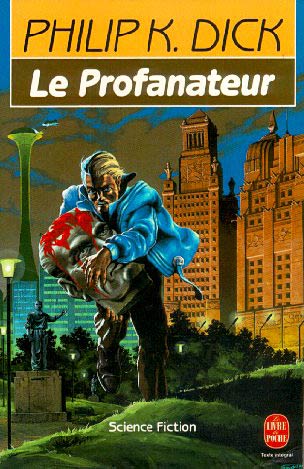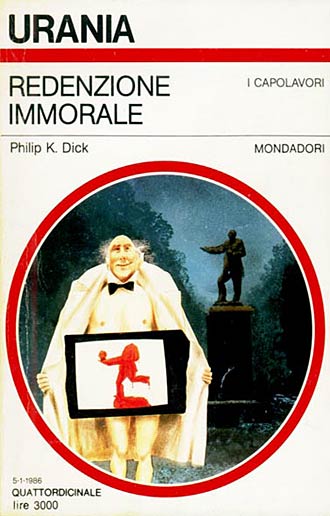
Added By: Administrator
Last Updated: valashain
The Man Who Japed
| Author: | Philip K. Dick |
| Publisher: |
Vintage, 2002 Methuen, 1983 Ace Books, 1975 |
| Series: | |
|
This book does not appear to be part of a series. If this is incorrect, and you know the name of the series to which it belongs, please let us know. |
|
| Book Type: | Novel |
| Genre: | Science-Fiction |
| Sub-Genre Tags: | Alternate History (SF) |
| Awards: | |
| Lists: | |
| Links: |
|
| Avg Member Rating: |
|
|
|
|
Synopsis
Originally appeared in Ace-Double D-193 (1956).
The Man Who Japed is Dick's mesmerizing and terrifying tale of a society so eager for order that it will sacrifice anything, including its freedom. Newer York is a post-holocaust city governed by the laws of an oppressively rigid morality. Highly mobile and miniature robots monitor the behavior of every citizen, and the slightest transgression can spell personal doom. Allen Purcell is one of the few people who has the capacity to literally change the way of the world, and once he's offered a high-profile job that acts as guardian of public ethics, he sets out to do precisely that. But first he must deal with the head in his closet.
Excerpt
1
At seven a.m., Allen Purcell, the forward-looking young president of the newest and most creative of the Research Agencies, lost a bedroom. But he gained a kitchen. The process was automatic, controlled by an iron-oxide-impregnated tape sealed in the wall. Allen had no authority over it, but the transfiguration was agreeable to him; he was already awake and ready to rise.
Squinting and yawning and now on his feet, he fumbled for the manual knob that released the stove. As usual the stove was stuck half in the wall and half out into the room. But all that was needed was a firm push. Allen pushed, and, with a wheeze, the stove emerged.
He was king of his domain: this one-room apartment within sight of the--blessed--Morec spire. The apartment was hard won. It had been his heritage, deeded to him by his family; the lease had been defended for over forty years. Its thin plasterboard walls formed a box of priceless worth; it was an empty space valued beyond money.
The stove, properly unfolded, became also sink and table and food cupboard. Two chairs hinged out from its underside, and beneath the stored supplies were dishes. Most of the room was consumed, but sufficient space remained in which to dress.
His wife Janet, with difficulty, had gotten into her slip. Now, frowning, she held an armload of skirt and looked around her in bewilderment. The central heating had not penetrated to their apartment as yet, and Janet shivered. In the cold autumn mornings she awoke with fright; she had been his wife three years but she had never adjusted to the shifts of the room.
"What's the matter?" he asked, shedding his pajamas. The air, to him, was invigorating; he took a deep breath.
"I'm going to reset the tape. Maybe for eleven." She resumed dressing, a slow process with much wasted motion.
"The oven door," he said, opening the oven for her. "Lay your things there, like always."
Nodding, she did so. The Agency had to be opened promptly at eight, which meant getting up early enough to make the half-hour walk along the clogged lanes. Even now sounds of activity filtered up from the ground level, and from other apartments. In the hall, scuffling footsteps were audible; the line was forming at the community bathroom.
"You go ahead," he said to Janet, wanting her dressed and ready for the day. As she started off, he added: "Don't forget your towel."
Obediently, she collected her satchel of cosmetics, her soap and toothbrush and towel and personal articles, and left. Neighbors assembled in the hall greeted her.
"Morning, Mrs. Purcell."
Janet's sleepy voice: "Morning, Mrs. O'Neill." And then the door closed.
When his wife was gone, Allen shook two corto-thiamin capsules from the medicine well. Janet owned all sorts of pills and sprays; in her early teens she had picked up undulant fever, one of the plagues revived by the attempt to create natural farms on the colony planets. The corto-thiamin was for his hangover. Last night he had drunk three glasses of wine, and on an empty stomach.
Entering the Hokkaido area had been a calculated risk. He had worked late at the Agency, until ten o'clock. Tired, but still restless, he had locked up and then rolled out a small Agency ship, a one-man sliver used to deliver rush orders to T-M. In the ship he had scooted out of Newer York, flown aimlessly, and finally turned East to visit Gates and Sugermann. But he hadn't stayed long; by eleven he was on his way back. And it had been necessary. Research was involved.
His Agency was totally outclassed by the giant four that made up the industry. Allen Purcell, Inc. had no financial latitude and no backlog of ideas. Its packets were put together from day to day. His staff--artists, historian, moral consultant, dictionist, dramatist--tried to anticipate future trends rather than working from patterns that had been successful in the past. This was an advantage, as well as a defect. The big four were hidebound; they constructed a standard packet perfected over the years, basically the time-tested formula used by Major Streiter himself in the days before the revolution. Moral Reclamation, in those days, had consisted of wandering troops of actors and lecturers delivering messages, and the major had been a genius at media. The basic formula was, of course, adequate, but new blood was needed. The major himself had been new blood; originally a powerful figure in the Afrikaans Empire--the re-created Transvaal State--he had revitalized the moral forces lying dormant in his own age.
"Your turn," Janet said, returning. "I left the soap and towel, so go right in." As he started from the room she bent to get out the breakfast dishes.
Breakfast took the usual eleven minutes. Allen ate with customary directness; the corto-thiamin had eliminated his queasiness. Across from him Janet pushed her half-finished food away and began combing her hair. The window--with a touch of the switch--doubled as a mirror: another of the ingenious space-savers developed by the Committee's Housing Authority.
"You didn't get in until late," Janet said presently. "Last night, I mean." She glanced up. "Did you?"
Her question surprised him, because he had never known her to probe. Lost in the haze of her own uncertainties, Janet was incapable of venom. But, he realized, she was not probing. She was apprehensive. Probably she had lain awake wondering if he were all right, lain with her eyes open staring at the ceiling until eleven-forty, at which time he had made his appearance. As he had undressed, she had said nothing; she had kissed him as he slid in beside her, and then she had gone to sleep.
"Did you go to Hokkaido?" she wondered.
"For a while. Sugermann gives me ideas . . . I find his talk stimulating. Remember the packet we did on Goethe? The business about lens-grinding? I never heard of that until Sugermann mentioned it. The optics angle made a good Morec--Goethe saw his real job. Prisms before poetry."
"But--" She gestured, a familiar nervous motion of her hands. "Sugermann's an egghead."
"Nobody saw me." He was reasonably certain of that; by ten o'clock Sunday night most people were in bed. Three glasses of wine with Sugermann, a half hour listening to Tom Gates play Chicago jazz on the phonograph, and that was all. He had done it a number of times before, and without untoward difficulty.
Bending down, he picked up the pair of oxfords he had worn. They were mud-spattered. And, across each, were great drops of dried red paint.
"That's from the art department," Janet said. She had, in the first year of the Agency, acted as his receptionist and file clerk, and she knew the office layout. "What were you doing with red paint?"
He didn't answer. He was still examining the shoes.
"And the mud," Janet said. "And look." Reaching down, she plucked a bit of grass dried to the sole of one shoe. "Where did you find grass at Hokkaido? Nothing grows in those ruins . . . it's contaminated, isn't it?"
"Yes," he admitted. It certainly was. The island had been saturated during the war, bombed and bathed and doctored and infested with every possible kind of toxic and lethal substance. Moral Reclamation was useless, let alone gross physical rebuilding. Hokkaido was as sterile and dead as it had been in 1972, the final year of the war.
"It's domestic grass," Janet said, feeling it. "I can tell." She had lived most of her life on colony planets. "The texture's smooth. It wasn't imported . . . it grows here on Earth."
With irritation he asked: "Where on Earth?"
"The Park," Janet said. "That's the only place grass grows. The rest is all apartments and offices. You must have been there last night."
Outside the window of the apartment the--blessed--Morec spire gleamed in the morning sun. Below it was the Park. The Park and spire comprised the hub of Morec, its omphalos. There, among the lawns and flowers and bushes, was the statue of Major Streiter. It was the official statue, cast during his lifetime. The statue had been there one hundred and twenty-four years.
"I walked through the Park," he admitted. He had stopped eating; his "eggs" were cooling on his plate.
"But the paint," Janet said. In her voice was the vague, troubled fear with which she met every crisis, the helpless sense of foreboding that always seemed to paralyze her ability to act. "You didn't do anything wrong, did you?" She was, obviously, thinking of the lease.
Rubbing his forehead, Allen got to his feet. "It's seven-thirty. I'll have to start to work."
Janet also rose. "But you didn't finish eating." He always finished eating. "You're not sick, are you?"
"Me," he said. "Sick?" He laughed, kissed her on the mouth, and then found his coat. "When was I last sick?"
"Never," she murmured, troubled and watching him. "There's never anything the matter with you."
At the base of the housing unit, businessmen were clustered at the block warden's table. The routine check was in progress, and Allen joined the group. The morning smelled of ozone, and its clean scent helped clear his head. And it restored his fundamental optimism.
The Parent Citizens Committee maintained a female functionary for each housing unit, and Mrs. Birmingham was typical: plump, florid, in her middle fifties, she wore a flowered and ornate dress and wrote out her reports with a powerfully authoritative fountain pen. It was a respected position, and Mrs. Birmingham had held the post for years.
"Good morning, Mr. Purcell." She beamed as his turn arrived.
"Hello, Mrs. Birmingham." He tip...
Copyright © 1975 by Philip K. Dick
Reviews
Images




























 Full Details
Full Details





